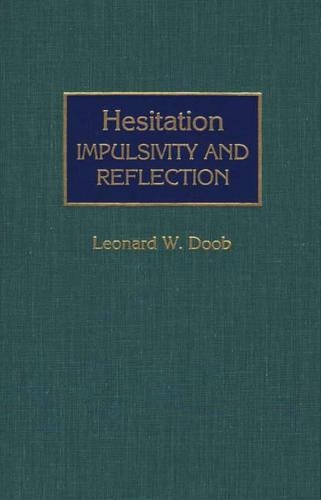
Hesitation: Impulsivity and Reflection
(Hardback)
Publishing Details
Hesitation: Impulsivity and Reflection
By (Author) Leonard W. Doob
Bloomsbury Publishing PLC
Praeger Publishers Inc
27th August 1990
United States
Classifications
Tertiary Education
Non Fiction
155.232
Physical Properties
Hardback
224
Description
This book provides an analysis of the human phenomenon of hesitation, the time elapsing between the stimulation of a person and that person's response. The views of disciplines as diverse as physiology and philosophy are examined, with special emphasis placed on psychology and the social sciences. Leonard Doob seeks to determine when and why human beings are impulsive or reflective, and whether, from their standpoint and that of others, their own hesitation should be extremely brief, long, or protractive. The volume also cites and summarizes relevant studies and derives guidelines related to subjective and objective hesitation. The volume covers a wide range of explanations for hesitation, starting with reflex actions (the central nervous system) and moving out to encompass an individual's culture and society, his personality development, and the influence that others may have over him. The study is divided into three main parts. An introduction serves to clarify the starting point for analysis, addressing the explanation and morality of hesitation and the questions of judgement that affect it. The next part analyzes hesitation in terms of culture and society, personality traits and interrelations, other persons and situations. The final section is devoted to selection, discussing the value of three degrees of hesitation and the techniques that can be employed to modify impulsivity and reflection.
Reviews
Clearly the seemingly simple notion of hesitation is not so simple notion of hesitation is not so simple after all. That may be the book's greatest contribution. It lays bare the true complexity of a deceptively simple phenomenon. Doob has given more than a moment of thought to hesitation; this book invites readers to do the same.-Contemporary Psychology
"Clearly the seemingly simple notion of hesitation is not so simple notion of hesitation is not so simple after all. That may be the book's greatest contribution. It lays bare the true complexity of a deceptively simple phenomenon. Doob has given more than a moment of thought to hesitation; this book invites readers to do the same."-Contemporary Psychology
Author Bio
LEONARD W. DOOB is Sterling Professor of Psychology Emeritus and Associate Director of the Southern African Research Program at Yale University. He is the author of many books including Inevitability (Greenwood Press, 1988) and a host of journal articles.
